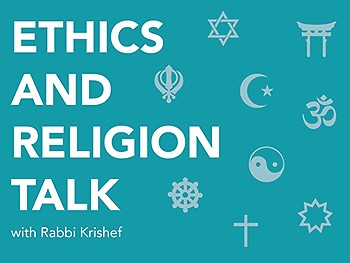Note: In the previous column, four of the Ethics and Religion Talk panelists discussed this question as it relations to interfaith social relationships and friendships. This week, three panelists respond to the question’s implications for romantic relationships.
Ty Silzer, a former pastor in the Presbyterian Church in America, responds:
“If you mean friendships, I would encourage you to have many and let them be full of love. If you come from a conservative background, this may allow you to one day ‘reach’ them; if from a progressive background, you will find they open your eyes to aspects of God you had not considered before, like Abram with Melchizedek, Moses with Jethro, Jesus and Judas, the Syro-Phoencian Woman, the Roman Centurion, Nicodemus, and more. The Bible is covered in relationships with those ‘on the outside,’ and finding God through those not traditionally labeled ‘the chosen.’
“I suspect you may be referring to that highest of relationships: your romantic interest who may one day be your significant other or spouse. Conservative Christianity cites: ‘Guard your heart’ (Proverbs 4:23) and point to Solomon’s many foreign wives (1 Kings 11:4) who ‘turned his heart after other gods’, culminating in 2 Corinthians 6:14 (citing Deuteronomy 22:10) ‘Do not be unequally yoked’ Some view these as commands, others as warnings.
“Why? We are social creatures. We tend to flock where our flock is going. So, at minimum, we should be mindful of where our (big and little) flocks are headed. If your crowd is doing something that violates your conscience? It’s very easy to swim downstream. But, does that make it an absolute? I personally know inter/multi-faith marriages that are very mature, and as a result, have a richness within them, and neither party supplants God for the other. It’s not for the weak.”
Father Michael Nasser, who writes from an Eastern Christian perspective and is Pastor of St. Nicholas Orthodox Christian Church, responds:
“Carefully! My advice to couples from different religious traditions is for each to fully explore not only their partner’s religious beliefs and faith, but more deeply examine their own, embarking on a united search for truth. Orthodox Christianity sees marriage as being given to us primarily for our pursuit of the Kingdom of Heaven as revealed most clearly by Jesus Christ. Therefore Orthodox Christians are only permitted to be married to other Orthodox Christians, or to non-Orthodox Christians who share the most fundamental teachings of the Christian faith.”
My response:
The liberal denominations of Judaism more fully welcome interfaith relationships than the traditional denominations. Liberal rabbis typically officiate at interfaith marriages (i.e., marriages in which one partner is not Jewish). The non-Jewish partner is welcome to take part in the religious life of the congregation as much as he or she is comfortable. Conversion to Judaism is relatively simple, requiring only a period of study and a public affirmation of one’s acceptance of the Jewish covenant.
The traditional denominations do not support rabbinic officiation at interfaith weddings. My denomination (Conservative) forbids me from officiating. The reasoning is that the language of a Jewish wedding ceremony assumes that each of the two people getting married is committed to the Jewish covenant of God and Israel through Torah. Liturgically, it makes no sense to use that language when one partner is not Jewish; and my commitment to traditional Jewish practice precludes me from changing centuries-old, time-honored, rituals to accommodate a person not of the Jewish faith.
In addition, within synagogue practice, only those who fully and exclusively embrace Judaism are welcome to take part in public religious rituals. Only Jews are called to the Torah to say blessings, only Jews may lead prayers, generally only Jews wear the tallit (prayer shawl) in public worship.
Conversion to Judaism is a long, intense process of study, participation in a Jewish community, and adoption of Jewish practices such as kashrut (dietary laws), Shabbat, and Holidays. Men must undergo an actual or symbolic circumcision, and all converts appear before a Beit Din (rabbinical court) of three rabbis followed by immersion in a natural body of water or a specially constructed ritual pool known as a mikvah.
Many traditional synagogues, including mine in Grand Rapids, welcome all individuals and couples who want to participate in a community which embraces traditional Jewish practice. Many interfaith couples who want this for themselves or their children choose to affiliate at such traditional congregations, even though they understand that the rabbi would not officiate at their wedding ceremony. More, however, choose to affiliate at Reform congregations where they feel more fully welcomed because the lack of traditional Jewish rituals and practice (including less use of Hebrew in prayer) reduce barriers for one who is not Jewish or Jewishly well educated.
This column answers questions of Ethics and Religion by submitting them to a multi-faith panel of spiritual leaders in the Grand Rapids area. We’d love to hear about the ordinary ethical questions that come up in the course of your day as well as any questions of religion that you’ve wondered about. Tell us how you resolved an ethical dilemma and see how members of the Ethics and Religion Talk panel would have handled the same situation. Please send your questions to [email protected].
The Rapidian, a program of the 501(c)3 nonprofit Community Media Center, relies on the community’s support to help cover the cost of training reporters and publishing content.
We need your help.
If each of our readers and content creators who values this community platform help support its creation and maintenance, The Rapidian can continue to educate and facilitate a conversation around issues for years to come.
Please support The Rapidian and make a contribution today.
